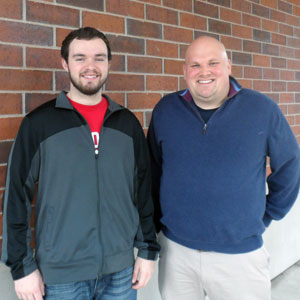An academic turnaround
Disability specialist helps SJU student overcome classroom struggles
May 28, 2014
By Elisabeth Leipholtz '15

Michael Harvot (left) and Tom Sagerhorn
Halfway through his first semester at Saint John's University this past fall, first-year student Michael Harvot was determined to leave school, as he was failing two of his classes and struggling with memory problems.
He had even informed his parents of his decision and packed all of his belongings. All that was left to do was meet the academic advising office and make things official.
But due to miscommunication in meeting time, the meeting did not occur as planned — a blessing in disguise, because with the assistance of Disability Services at the College of Saint Benedict and Saint John's University, Harvot is now passing all of his classes and well on his way to strongly finishing his first academic year at SJU with his average grade being a B.
"The hardest part was that initially I said, 'I don't want to be stupid anymore,' " Harvot said. "But I wasn't stupid. I knew I had a problem."
Concussions caused problems
Harvot began playing baseball at age five and continued through senior year at Oshkosh (Wisconsin) North High School. In that time, he suffered six diagnosed concussions, as well as about 15 undiagnosed concussions from various other sports and activities. Harvot did not start noticing effects of the concussions until the 10th grade, when the mood swings and anxiety became more apparent.
After silently struggling through the first two months of college classes and attempting to leave campus, Harvot decided to turn to CSB/SJU Disability Specialist Tom Sagerhorn, who worked with him to understand his medical history and referred him to a team of 15 specialists.
"The belief within the office is that somebody's personal health and well-being are more important than academics," Sagerhorn said. "It might sound patronizing to say, 'Your health is more important, don't think about school,' but we like to think from wellness perspective. You can't be a student unless you're taking care of yourself."
After a few months, Harvot eventually came to this realization as well.
"I was so mad and apprehensive the first month," Harvot said. "I wanted stuff to happen right away, I wanted to be better. Looking back, I was such a jerk to them (Disability Services), but they knew where I was coming from because I had been dealing with this for seven years and it was so much worse being out of the safe environment at home."
A tough academic transition
Including post-concussive disorder, Harvot faces five diagnosed disabilities — dyslexia, ADD, depression, and anxiety, as well as possible ADHD. Based on the federal government's description, a disability is "a condition which impacts major life function." The aforementioned combination has made his academic life particularly challenging, especially transitioning from high school to SJU.
"In high school, I had a 3.84 GPA and high honors," Harvot said. "I could study something the night before, spit it out and never use it again. But in college everything is built on itself. You learn something in the first week and need to know it weeks from then. That was hard with my memory almost gone."
"Individuals with disabilities, or what the federal government calls disabilities, don't always consider themselves disabled," Sagerhorn said. "Our goal is not so much to focus on the disability but to reduce any barriers we have within the institution."
Harvot now attends speech and memory therapy, which has raised his functionality from 20 percent to 80 percent, he said. He uses strategies such as entering reminders in his phone for everything from class schedules to when to take medications. He plans each minute of his day, from when he wakes up to when he goes to bed. He will sometimes take verbal tests instead of written, and almost always wears sunglasses in the classroom as he is very sensitive to light. On top of a rigorous academic schedule as a physics major, he is also training for a half ironman competition in summer 2015.
"We don't provide preferential treatment," Sagerhorn said. "It's not to give students a leg up on peers, or to make sure students succeed. We want them to succeed, but we're here to provide access, access to the playing field. They're getting an equal opportunity to demonstrate what they are capable of doing or to demonstrate knowledge."
A marked improvement
Over the past six months of working together, both Harvot and Sagerhorn have seen significant improvement in both Harvot's attitude and performance.
"You can see it in his confidence level, in how he carries himself," Sagerhorn said. "He is definitely in a better place. In his mind, he will never be where he wants to be, but he is taking care of himself, which will allow him to be successful here and in life. There has been a major shift in thinking. He realized he has to think about the long term, not just the now. It's hard for young people to do that."
After struggling through his first semester, Harvot has become vocal about the challenges he faced and hopes to provide outreach to other students in a similar situation.
"He was struggling, but he has a strong desire to serve," Sagerhorn said. "It's been fun to be able to have students reach out, even though sometimes it can be hard to have them do it."
Harvot recognizes the hesitancy students may face, but also encourages them to step forward and ask for support.
"It's about going and getting help because that was the hardest part," Harvot said. "I was so opposed to going to therapy. Then I went and it was like, 'Wow, you can talk about stuff and it's OK.' That was what really helped me to be an advocate. Now through this, I want to help other kids be advocates for themselves like I am."
